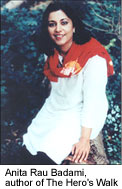The Rediff US Special/Meera Nair


When Anita Rau Badami's first novel Tamarind Mem became a huge success within a few months of release, the Canadian writer was, more than anything else, alarmed.
"Quite absurd, really, to become a celebrity on the basis of one book. I found that scary and silly," she recalled recently from her home in Vancouver.
Her reaction was understandable. The novel was her master's thesis from a literature course she had taken. Not something one normally expects publishers to go ga-ga over. As she tells the story, "I didn't know anything about agents, I didn't even know such a creature existed."
So she did what every agent vociferously advises against -- sent her manuscript directly to a publisher.
"I sent the book to Penguin first because when we were children all the books in our homes were Penguin paperbacks, so that was the name I was most familiar with."
Fortunately for her, Penguin bought the manuscript, handed her a contract and sold the book in the United Kingdom, India and Germany. Ecstatic reviews and celebrity status followed.
But all Badami has to say about that happy time is a disgruntled "it interfered with the writing of my second book". Her reaction may have something to do with the fact that Badami used to be a journalist and freelance writer, and like any conscientious scribe she had moved on to her next project.
Her next book was The Hero's Walk. It established Badami as a formidable literary talent and won The Commonwealth Writers Prize 2001 (Caribbean & Canada Region) and The Marian Engel Award for excellence in fiction for a body of work. It was also a finalist in the 2000 Kiriyama Pacific Rim Prize for fiction.
Last month Algonquin Press released The Hero's Walk in the United States. Set in the imaginary town of Tottapuram, The Hero's Walk brings us an authentic India with its teeming streets, bribe-hungry cops and smells of sewage. And the huge cutouts of a female chief minister that loom over the denizens of Tottapuram will feel familiar to some readers.
"I am not going to say it's Jayalalitha... but I couldn't resist," Badami laughs when questioned.
The reluctant hero of this warm, poignant, compelling novel is the perfectly ordinary Sripathi Rao. At 57, faced with a stalled career as copywriter and the unending burdens of family life, Sripathi Rao has only unfocused anger and his self-centredness to sustain him.
 His general disaffection is intensified by the fact that he is estranged from Maya, his beloved and accomplished daughter. Maya, settled in faraway Canada, has committed the cardinal sin of marrying a foreigner. His ambitions for her thwarted, Sripathi disowns her: "You will never show your face in this house again. Never."
His general disaffection is intensified by the fact that he is estranged from Maya, his beloved and accomplished daughter. Maya, settled in faraway Canada, has committed the cardinal sin of marrying a foreigner. His ambitions for her thwarted, Sripathi disowns her: "You will never show your face in this house again. Never."
Assembled around this pathetic yet powerful central figure is a memorable cast of characters. Sripathi's tolerant and unswervingly good wife Nirmala, his sweetly na´ve unmarried sister Putti, his poisonous mother Ammaya and his mild-mannered activist son Arun.
Badami breathes vibrant life into each resident of Sripathi's disintegrating ancestral home with an unflinching exploration of the nooks and crannies of their minds.
Which is what one would expect from a writer whose central preoccupation is character.
"A character starts intriguing me for any odd reason," Badami muses. "Then I wonder how this character would respond to this kind of stimulus, how would he or she react when placed in this kind of situation."
The narrative stone that disturbs the stagnant surface of Sripathi's life is the death of Maya and her husband in an accident. Sripathi is left with the responsibility of caring for their seven-year-old girl, the granddaughter he has never met. According to Badami, this particular plot line came to her through pure serendipity.
"A friend happened to mention some people in the US who died abruptly in an accident leaving two little children. There was this huge confusion about transferring them to India. I got intrigued. So that became the thread."
Badami used the skein to knit together diverse story lines. Putti struggles against the selfish Ammaya's designs to keep her unmarried; the wise Nirmala invents ways to keep her family whole; and Arun gently teaches his intolerant father a lesson in acceptance.
These minor domestic dramas are played out in counterpoint to the major event in the novel -- the homecoming of Maya's little girl and the metamorphosis of Sripathi Rao.
Badami has her reasons for choosing to create what she characterizes as "a structured, conventional novel with a linear progression of events".
"For me the structure of the book must echo everything that is going on in it, so the structure is as closed as what goes on in that house and the minds of these people," she explains with the analytical earnestness of a literature graduate.
But structure is the only traditional thing in the novel. The predicaments of Sripathi and his family are alternatively tragic and laugh-out-loud funny. Badami's vibrant, graceful language limns every scene with power and resonance. And Tottapuram is wittily observed even as its ancient streets buckle and strain under the pressures of rapid change.
Best of all, Badami convinces us with every line of her affection and empathy for India and its singular chaos. "I happen to love that country. I lived there for 29 years and it's not something you can get out of your system in a hurry," she asserts. "And I try not to write from a tourist perspective. So even if I talk about corruption it's with a sympathetic understanding."
Badami brings the same compassion to her characters, even the intractable Sripathi. By the satisfying end of The Hero's Walk, Sripathi has transcended his selfishness and learnt to forgive. He has become a true hero. And along with him we begin to understand Badami's gentle teaching. She says it with characteristic grace: "Just the act of living is heroic enough."
Back to top
Tell us what you think of this feature